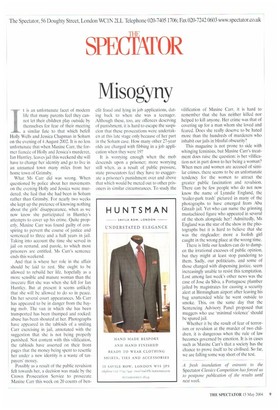isogyny
t is an unfortunate facet of modern life that many parents feel they can not let their children play outside by themselves for fear of their meeting -a similar fate to that which befell Holly Wells and Jessica Chapman in Soham on the evening of 4 August 2002. It is no less unfortunate that when Maxine Carr, the former fiancée of Holly and Jessica's murderer, Ian Huntley. leaves jail this weekend she will have to change her identity and go to live in an unnamed town many miles from her home town of Grimsby.
What Ms Carr did was wrong. When questioned by police about her movements on the evening Holly and Jessica were murdered. she lied that she had been in Soham rather than Grimsby. For nearly two weeks she kept up the pretence of knowing nothing about the girls' disappearance, when as we now know she participated in Huntley's attempts to cover up his crime. Quite properly, Maxine Carr was found guilty of conspiring to pervert the course of justice and sentenced to three and a half years in jail. Taking into account the time she served in jail on remand, and parole, to which most prisoners are entitled. Ms Carr's sentence ends this weekend.
And that is where her role in the affair should be laid to rest. She ought to be allowed to rebuild her life, hopefully as a more sensible and mature woman than the insecure flirt she was when she fell for Ian Huntley. But at present it seems unlikely that she will be allowed to do so in peace. On her several court appearances, Ms Carr has appeared to be in danger from the baying mob. The van in which she has been transported has been thumped and rocked; abuse has been shouted at her. Photographs have appeared in the tabloids of a smiling Carr exercising in jail, annotated with the suggestion that she is not being properly punished. Not content with this vilification, the tabloids have asserted on their front pages that the money being spent to resettle her under a new identity is a waste of taxpayers' money.
Possibly as a result of the public revulsion felt towards her, a decision was made by the Crown Prosecution Service to prosecute Maxine Carr this week on 20 counts of ben
efit fraud and lying in job applications, dating back to when she was a teenager. Although these, too, are offences deserving of punishment, it is hard to escape the suspicion that these prosecutions were undertaken at this late stage only because of her part in the Soham case. How many other 27-year olds are charged with fibbing in a job application when they were 19?
It is worrying enough when the mob descends upon a prisoner; more worrying still when, as a result of public pressure, state prosecutors feel they have to exaggerate a prisoner's punishment over and above that which would be meted out to other prisoners in similar circumstances. To study the vilification of Maxine Carr, it is hard to remember that she has neither killed nor helped to kill anyone. Her crime was that of covering up for a man whom she loved and feared. Does she really deserve to be hated more than the hundreds of murderers who inhabit our jails in blissful obscurity?
This magazine is not prone to side with whinging feminists, but Maxine Carr's treatment does raise the question: is her vilification not in part down to her being a woman? When men and women are accused of similar crimes, there seems to be an unfortunate tendency for the women to attract the greater public fascination and revulsion. There can be few people who do not now know the name of Lynndie England, the 'trailer-park trash' pictured in many of the photographs to have emerged from Abu Ghraib jail. Yet who can name the grinning mustachioed figure who appeared in several of the shots alongside her? Admittedly, Ms England was the star of the show in the photographs but it is hard to believe that she was the ringleader: more a foolish girl caught in the wrong place at the wrong time.
There is little our leaders can do to dampen the irrational excesses of public opinion, but they might at least stop pandering to them. Sadly, our politicians, and some of those charged with dispensing justice, seem increasingly unable to resist this temptation. Lost among last week's other news was the case of Jose da Silva, a Portuguese plumber jailed by magistrates for causing a security alert at Birmingham airport after leaving his bag unattended while he went outside to smoke. This, on the same day that the Sentencing Advisory Panel proposed that muggers who use 'minimal violence' should be spared jail.
Whether it be the result of fear of terrorism or revulsion at the murder of two children, it is dangerous when the rule of law becomes governed by emotion. It is in cases such as Maxine Carr's that a society has the chance to prove itself to be civilised. So far, we are falling some way short of the test.
A fresh inundation of entrants to the Spectator Classics Competition has forced us to postpone publication of the results until next week.


































































































 Previous page
Previous page